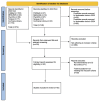Online Interventions Addressing Health Misinformation: Scoping Review
- PMID: 40906516
- PMCID: PMC12447009
- DOI: 10.2196/69618
Online Interventions Addressing Health Misinformation: Scoping Review
Abstract
Background: Misinformation in health and health care contexts threatens public health by undermining initiatives, spreading dangerous behaviors, and influencing decision-making. Given its reach on online platforms and social media, there is growing demand for interventions addressing misinformation. Literature highlights the importance of theoretical underpinnings (frameworks and models) to guide the development of educational interventions targeting both the features of misinformation and the human traits that increase susceptibility.
Objective: This review examines literature on online interventions targeting health misinformation to mitigate adverse public health impacts. It explores intervention types, population demographics, susceptibility-related human attributes, and misinformation characteristics addressed. It also identifies the theoretical underpinnings used and gaps in the literature.
Methods: The review followed a methodological framework and adhered to PRISMA-ScR (Preferred Reporting Items for Systematic Reviews and Meta-Analyses extension for Scoping Reviews) guidelines. A search strategy combining Medical Subject Headings (MeSH) and keywords was used to search five databases for studies published between 2018 and 2024. Identified studies underwent deduplication, title and abstract screening using predefined eligibility criteria, full-text screening, and data extraction.
Results: The initial search yielded 513 citations; 30 (5.8%) studies were included after screening. Of these, 19 (63%) focused on COVID-19 misinformation, 11 (37%) on other health contexts, and 1 (3%) addressed misinformation conceptually. Regarding intervention type, 22 (73%) used educational courses, 7 (23%) employed counter speech, and 1 (3%) used inoculation games, with some overlap. Sixteen (53%) interventions targeted characteristics of misinformation, categorized as content and presentation tactics, cognitive and psychological biases, social and cultural influences, and dissemination strategies. Seven (23%) interventions focused on specific demographics, while 14 (47%) addressed human attributes that heighten susceptibility. These attributes were grouped into knowledge and processing, emotional and psychological factors, and trust and social dynamics. Theoretical underpinnings guided intervention development in 23 (77%) studies, often overlapping in categories including inoculation and correction, education and cognition, motivation and emotion, behavior and persuasion, trust and belief, and learning design.
Conclusions: Online interventions targeting health misinformation often share outcome goals and use overlapping strategies such as educational courses, counter speech, and inoculation games. Many adopt multifaceted approaches to address misinformation's complexity. However, gaps remain in tailoring interventions to misinformation characteristics that could improve specificity and impact. Few studies focus on human attributes contributing to belief in and spread of misinformation, particularly among vulnerable groups. While theoretical models are commonly cited, clearer reporting and stronger connections to intervention design are needed. Collaboration among intervention developers, theorists, and psychologists is recommended to enhance future interventions.
International registered report identifier (irrid): RR2-10.31219/osf.io/mfujb.
Keywords: disinformation; educational intervention; health; health care; misinformation.
©Hiya Grover, Radwa Nour, Nabil Zary, Leigh Powell. Originally published in the Journal of Medical Internet Research (https://www.jmir.org), 04.09.2025.
Conflict of interest statement
Conflicts of Interest: None declared.
Figures




References
-
- "Misinformation". Dictionary.com. [2024-09-17]. https://www.dictionary.com/browse/misinformation .
-
- Infodemics and misinformation negatively affect people’s health behaviours, new WHO review finds. World Health Organization. 2022. Sep 1, [2024-08-06]. https://www.who.int/azerbaijan/news/item/01-09-2022-infodemics-and-misin... .
-
- Rodrigues F, Newell R, Rathnaiah Babu G, Chatterjee T, Sandhu NK, Gupta L. The social media infodemic of health-related misinformation and technical solutions. Health Policy Technol. 2024 Jun;13(2):100846. doi: 10.1016/j.hlpt.2024.100846. - DOI
-
- Fighting misinformation in the time of COVID-19, one click at a time. World Health Organization. 2021. Apr 27, [2024-08-06]. https://www.who.int/news-room/feature-stories/detail/fighting-misinforma... .
-
- Rao TS, Andrade C. The MMR vaccine and autism: sensation, refutation, retraction, and fraud. Indian J Psychiatry. 2011 May;53(2):95–6. doi: 10.4103/0019-5545.82529. http://www.indianjpsychiatry.org/article.asp?issn=0019-5545;year=2011;vo... IJPsy-53-95 - DOI - PMC - PubMed
Publication types
MeSH terms
LinkOut - more resources
Full Text Sources
Miscellaneous

